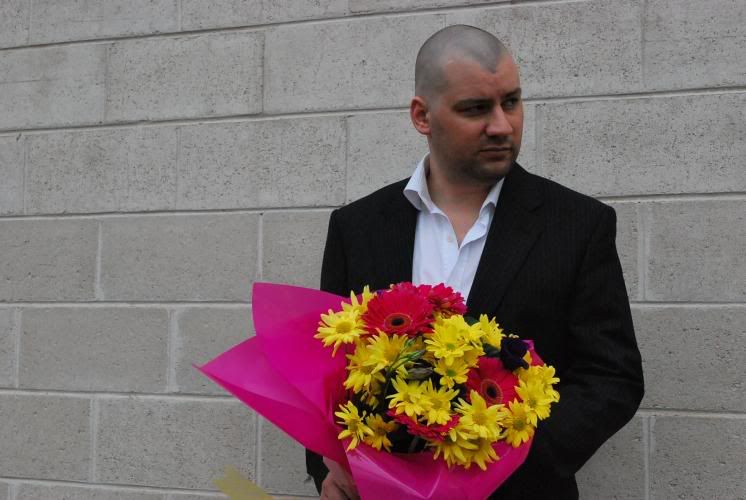The Bougainville Photoplay Project – Version 1.0 at The Old Fitz
This was truly an extraordinary night of theatre. The concept is quite simple. Paul Dwyer recounts some stories from his life based around his trips to Bougainville, a small region of Papua New Guinea. In the course of doing so, we learn about his father’s work as a surgeon, the various human rights abuses that have been perpetrated in Bougainville, and the amazing reconciliation process that is now occurring in the region. The stories themselves are amazing, insightful and at times truly horrifying. The delivery is honest and is set against the backdrop of the physical objects of Dwyer’s memories – newspaper articles, photos, and even a set of bones that his dad once used to demonstrate surgical techniques. There are several visual aids to the storytelling, from an old slide projector, to Sean Bacon’s video stylings which were perfectly measured as usual. However, the true victory of this show is that amidst these many technical elements and dramatic techniques, the story is what comes through. It is because the show is so tightly crafted that the message comes through pure and strong.
 For more info about Bougainville, one can consult the ever-useful wikipedia http://en.wikipedia.org/wiki/History_of_Bougainville
For more info about Bougainville, one can consult the ever-useful wikipedia http://en.wikipedia.org/wiki/History_of_BougainvilleGethsemane – Belvoir St
I know I’m coming incredibly late to the party, but I think I just might be a David Hare fan. After seeing this show I finally got around to reading The Vertical Hour which I bought a few months back, and I was impressed by both, and if the hype is anything to go by I haven’t even got to his best plays yet. I was expecting a lot from Gethsemane. I cared a lot about the subject matter, the problem of corporate funding controlling political parties, and I’m yet to see an Armfield show that I dislike (Scorched in particular was an affecting experience).
 For the most part, the show delivered. The script was tight, and merciless, going for the jugular of a variety of political players, the direction cool (setting props by lighting rectangles? Very cool…) and the performances were mostly memorable. In a weird turn of events, it was Charlie Garber’s Fran Pegg, the irrepressible butler, that stole the show, with Garber turning one word answers into moments of comedy brilliance. In fact all the younger players were impressive, with Emily Barclay simply stunning as the troubled teenager of the home secretary, played with equal skill by Sarah Peirse. However, Claire Jones as sympathetic teacher was anything but sympathetic, and Dan Wyllie’s journalist never seemed real to me. Hard to reconcile from actors with such strong history.
For the most part, the show delivered. The script was tight, and merciless, going for the jugular of a variety of political players, the direction cool (setting props by lighting rectangles? Very cool…) and the performances were mostly memorable. In a weird turn of events, it was Charlie Garber’s Fran Pegg, the irrepressible butler, that stole the show, with Garber turning one word answers into moments of comedy brilliance. In fact all the younger players were impressive, with Emily Barclay simply stunning as the troubled teenager of the home secretary, played with equal skill by Sarah Peirse. However, Claire Jones as sympathetic teacher was anything but sympathetic, and Dan Wyllie’s journalist never seemed real to me. Hard to reconcile from actors with such strong history.Unfortunately, the play lacked a strong ending, something I found similarly problematic in the Vertical hour. It seemed in both texts as if once Hare had finished his political discussions he struggled to conclude the personal stories, and in turn the plays. I’ll keep an eye out to see whether this is a theme that runs throughout his oeuvre.
A Streetcar Named Desire – Sydney Theatre Company

Now we come to one of the most anticipated theatre events of the year. Cate Blanchett as Blanche. This was the show that more people in Sydney were going to see than any other, and therefore the biggest theatrical opportunity of the year, and in my opinion it was wasted. There is no question that the acting was top notch. With the exception of a few of the bit parts, the performances were solid and beautifully crafted, and yes Cate proved once again that she is truly a chameleon, this time eschewing her powerful low register to take on the soprano range of the faux-timid Blanche. What was so frustrating though was that the play was really, really slow. I got bored, regularly, and maybe that’s because I’m born of the internet generation that as a result of tabbed browsing and violent video games can’t pay attention to anything for longer than 30 seconds, or maybe it’s because I’ve studied the text twice at different institutions. Maybe it’s because I missed the details of the relationships, or because I’d driven 2 hours in the pouring rain and was a bit stressed and was therefore distracted easily. But maybe, just maybe it was because this main stage production, which sold out before it opened, whose budget I can only imagine, was directed by a first time theatre director, was horribly paced, and failed to find anything new or insightful in the text, and instead simply came over as a bit bland. I was hugely disappointed. I have been defending Cate and Andrew’s decision making to the more cynical of my theatre friends all year, and was disappointed to not have a gem in the crown of my argument. I just hope star-studded Uncle Vanya next year doesn’t prove to be another lifeless staging, a fear that will perhaps be confirmed or denied when the director is finally revealed.
Well that’s all I have for now. I’m off to the next in the Appleloft series, a performance night presented by everyone’s favourite performance collective Applespiel.
- Simon
